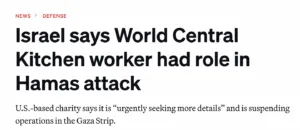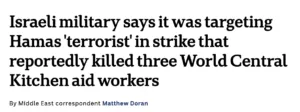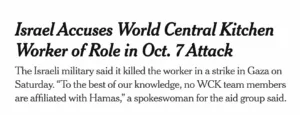RSS
Israel Killed Gaza Aid Worker Who Participated in Oct. 7 Massacre; Media Framed It as Cruel Murder

Aerial view shows a World Central Kitchen (WCK) barge loaded with food arriving off Gaza, in this handout image released March 15, 2024. Photo: Israel Defense Forces/Handout via REUTERS
The IDF announced on Saturday that it had conducted a targeted strike on a vehicle inside Gaza, eliminating Hazmi Kadih (also known as Ahed Azmi Qudeih), a Palestinian who infiltrated Kibbutz Nir Oz and took part in the October 7 terror attacks last year.
Kadih also happens to have been an employee of the World Central Kitchen (WCK) aid agency.
True to form, WCK joined the bloated, overfunded ecosystem of Palestinian-focused aid organizations professing ignorance about their staff’s double lives, instead issuing a statement expressing that it was “heartbroken” over the incident and claiming to have “no knowledge that any individual in the vehicle had alleged ties to the October 7th Hamas attack.”
This response is particularly rich coming from an organization that, earlier this year, demanded an “independent inquiry” into the IDF’s actions after several WCK workers were killed in an Israeli strike in April.
Back then, WCK declared that the IDF could not “credibly” investigate itself and insisted that “systemic change” was necessary to prevent “more military failures, more apologies, and more grieving families.”
Perhaps WCK will now call for an independent inquiry into how someone who took part in the mass murder of innocent civilians –and made his support for it crystal clear on social media — managed to infiltrate its ranks.
Or will this damning revelation be quietly brushed aside, as accountability rarely seems to flow in the other direction?
I found the Facebook account of Ahed Azmi Qadi, the @WCKitchen employee who was also a terrorist who participated in the October 7th massacre.
Let’s see what he’s posted
https://t.co/yuMVW8auLB pic.twitter.com/32XDgGIT5y
— Eitan Fischberger (@EFischberger) November 30, 2024
We somehow suspect it will be the latter, and it wouldn’t be all that surprising, given that the media are already laying the groundwork to help WCK weather this scandal unscathed.
Let’s examine the headlines reporting the IDF’s strike on the terrorist-linked vehicle.
Nearly every mainstream news outlet — including BBC, NPR, AFP, Reuters, and Sky News — framed the incident as Israel simply “killing aid workers,” while emphasizing that WCK has now suspended its Gaza operations as a result of the strike.
This narrative seems carefully constructed to villainize Israel, and deflect scrutiny from WCK’s hiring practices — or the uncomfortable evidence that one of its employees was involved in a massacre of innocent civilians.
To its credit, Sky News at least acknowledged the Hamas connection to the October 7 attacks in its subheading — a minimal nod to the context that others failed to provide.

Below are the headlines from Reuters, the BBC, NPR, and AFP — all of which hid the truth:

Reuters

BBC

NPR

AFP
In contrast, a handful of outlets, including The New York Times, ABC News, POLITICO, The Los Angeles Times, and, surprisingly, The Guardian, deserve commendation for including the IDF’s statement that Hazmi Kadih was a terrorist.
Their reporting proves that it is possible to fit critical facts into a headline, but that in some cases the media chooses not to.

The Guardian

POLITICO


New York Times

Los Angeles Times
As we’ve seen time and again, there’s a troubling “dualism” within these organizations operating in Gaza. Publicly, they speak in the language of compassion and neutrality. Behind the scenes, however, they are too often staffed with antisemites, terror sympathizers, or the dangerously naive.
This latest revelation about WCK employing a terrorist isn’t an outlier — it’s yet another glaring example of the systemic issues plaguing the overfunded and under-scrutinized aid sector in Gaza.
Back in April, when Israel swiftly acknowledged, apologized for, investigated, and even dismissed senior officers involved in a tragic drone strike that killed WCK aid workers, the media wasted no time branding Israel as guilty of everything from “trigger-happy behavior” to “going rogue.”
The incident wasn’t treated as an isolated, tragic mistake — the kind that happens in warfare, as we’ve seen countless times with many of Israel’s closest allies fighting in the Middle East, including the United States.
And yet, whenever an aid worker in Gaza is unmasked as a Hamas terrorist, the media fall conspicuously silent. If the connection to terrorism is acknowledged at all, it’s presented as a one-off anomaly rather than evidence of a systemic “terror problem” within these organizations. The same scrutiny and outrage never seem to apply.
It’s the double standard we’ve come to expect but must not accept. How many more so-called “humanitarian workers” must be exposed as murderous terrorists before the media acknowledge that not every aid group is beyond reproach? This pattern of silence and selective outrage cannot continue. It’s time for the media to hold these organizations accountable — or at least admit they have no interest in doing so.
The author is a contributor to HonestReporting, a Jerusalem-based media watchdog with a focus on antisemitism and anti-Israel bias — where a version of this article first appeared.
The post Israel Killed Gaza Aid Worker Who Participated in Oct. 7 Massacre; Media Framed It as Cruel Murder first appeared on Algemeiner.com.
RSS
After False Dawns, Gazans Hope Trump Will Force End to Two-Year-Old War

Palestinians walk past a residential building destroyed in previous Israeli strikes, after Hamas agreed to release hostages and accept some other terms in a US plan to end the war, in Nuseirat, central Gaza Strip October 4, 2025. Photo: REUTERS/Mahmoud Issa
Exhausted Palestinians in Gaza clung to hopes on Saturday that US President Donald Trump would keep up pressure on Israel to end a two-year-old war that has killed tens of thousands and displaced the entire population of more than two million.
Hamas’ declaration that it was ready to hand over hostages and accept some terms of Trump’s plan to end the conflict while calling for more talks on several key issues was greeted with relief in the enclave, where most homes are now in ruins.
“It’s happy news, it saves those who are still alive,” said 32-year-old Saoud Qarneyta, reacting to Hamas’ response and Trump’s intervention. “This is enough. Houses have been damaged, everything has been damaged, what is left? Nothing.”
GAZAN RESIDENT HOPES ‘WE WILL BE DONE WITH WARS’
Ismail Zayda, 40, a father of three, displaced from a suburb in northern Gaza City where Israel launched a full-scale ground operation last month, said: “We want President Trump to keep pushing for an end to the war, if this chance is lost, it means that Gaza City will be destroyed by Israel and we might not survive.
“Enough, two years of bombardment, death and starvation. Enough,” he told Reuters on a social media chat.
“God willing this will be the last war. We will hopefully be done with the wars,” said 59-year-old Ali Ahmad, speaking in one of the tented camps where most Palestinians now live.
“We urge all sides not to backtrack. Every day of delay costs lives in Gaza, it is not just time wasted, lives get wasted too,” said Tamer Al-Burai, a Gaza City businessman displaced with members of his family in central Gaza Strip.
After two previous ceasefires — one near the start of the war and another earlier this year — lasted only a few weeks, he said; “I am very optimistic this time, maybe Trump’s seeking to be remembered as a man of peace, will bring us real peace this time.”
RESIDENT WORRIES THAT NETANYAHU WILL ‘SABOTAGE’ DEAL
Some voiced hopes of returning to their homes, but the Israeli military issued a fresh warning to Gazans on Saturday to stay out of Gaza City, describing it as a “dangerous combat zone.”
Gazans have faced previous false dawns during the past two years, when Trump and others declared at several points during on-off negotiations between Hamas, Israel and Arab and US mediators that a deal was close, only for war to rage on.
“Will it happen? Can we trust Trump? Maybe we trust Trump, but will Netanyahu abide this time? He has always sabotaged everything and continued the war. I hope he ends it now,” said Aya, 31, who was displaced with her family to Deir Al-Balah in the central Gaza Strip.
She added: “Maybe there is a chance the war ends at October 7, two years after it began.”
RSS
Mass Rally in Rome on Fourth Day of Italy’s Pro-Palestinian Protests

A Pro-Palestinian demonstrator waves a Palestinian flag during a national protest for Gaza in Rome, Italy, October 4, 2025. Photo: REUTERS/Claudia Greco
Large crowds assembled in central Rome on Saturday for the fourth straight day of protests in Italy since Israel intercepted an international flotilla trying to deliver aid to Gaza, and detained its activists.
People holding banners and Palestinian flags, chanting “Free Palestine” and other slogans, filed past the Colosseum, taking part in a march that organizers hoped would attract at least 1 million people.
“I’m here with a lot of other friends because I think it is important for us all to mobilize individually,” Francesco Galtieri, a 65-year-old musician from Rome, said. “If we don’t all mobilize, then nothing will change.”
Since Israel started blocking the flotilla late on Wednesday, protests have sprung up across Europe and in other parts of the world, but in Italy they have been a daily occurrence, in multiple cities.
On Friday, unions called a general strike in support of the flotilla, with demonstrations across the country that attracted more than 2 million, according to organizers. The interior ministry estimated attendance at around 400,000.
Italy’s right-wing government has been critical of the protests, with Prime Minister Giorgia Meloni suggesting that people would skip work for Gaza just as an excuse for a longer weekend break.
On Saturday, Meloni blamed protesters for insulting graffiti that appeared on a statue of the late Pope John Paul II outside Rome’s main train station, where Pro-Palestinian groups have been holding a protest picket.
“They say they are taking to the streets for peace, but then they insult the memory of a man who was a true defender and builder of peace. A shameful act committed by people blinded by ideology,” she said in a statement.
Israel launched its Gaza offensive after Hamas terrorists staged a cross border attack on October 7, 2023, killing some 1,200 people and taking 251 people hostage.
RSS
Hamas Says It Agrees to Release All Israeli Hostages Under Trump Gaza Plan

Smoke rises during an Israeli military operation in Gaza City, as seen from the central Gaza Strip, October 2, 2025. Photo: REUTERS/Dawoud Abu Alkas
Hamas said on Friday it had agreed to release all Israeli hostages, alive or dead, under the terms of US President Donald Trump’s Gaza proposal, and signaled readiness to immediately enter mediated negotiations to discuss the details.


